
News |
- American Renewables Portfolio Includes Some Hydro
- Pollution and Cancer Linked, Including Near Tar Sands
- Whales Get Reprieve From Russian Oil Platform
- United Kingdom: Bans All Wild Animals in Circuses Effective 2015
- Cold Lake Bitumen Leak Likely Contaminated Groundwater
- Grasslands Protection Urgent, CEC Report Launched
- Russia Drops Piracy Charges Against Greenpeace Activists
- Landmark Canadian Hydraulic Fracturing Lawsuit
- World Says No To Fracking
- Shale Gas Company Loses Bid to Extend Injuction
- CETA Would Undermine Environmental Protection
- Plummet in Canadian Bee Population Linked to Neonicotinoid Insecticide
| American Renewables Portfolio Includes Some Hydro | 8 November 13 |
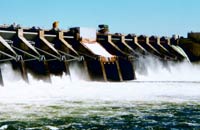
Introduced by Sen. Edward Markey, D-Mass., and referred to the Senate Committee on Energy and Natural Resources, the American Renewable Energy and Efficiency Act (officially Senate Bill 1627) would require utilities to obtain a minimum of 25% of their power from renewable sources by 2025. Included in the bill's definition of "renewable" are hydropower, wind, solar, geothermal and biomass. Markey's office said 118 other nations already have national clean energy targets in place, and though 30 states and the District of Columbia already have mandatory renewable targets, America has yet to adopt a national standard. The bill's provisions for hydroelectricity apply only to "qualified hydropower", which includes a number of stipulations. The renewable electricity requirement dictated by the legislation would begin at 6% in 2015 and increase gradually over the next decade. Utilities would also be issued one renewable electricity credit for each MWh of power produced from a renewable source, which could be sold, traded, submitted for compliance or banked for future use, Markey's office said. View American Renewable Energy and Efficiency ActView November 1, 2013 Hydro World article View November 1, 2013 CleanTechIQ article View October 31, 2013 Natural Resources Defense Council report View October 31, 2013 Senator Markey press release |
|
 Print version Print version |
Top |
| Pollution and Cancer Linked, Including Near Tar Sands | 4 November 13 |
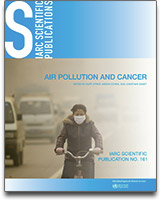
In Canada, A new study has found that levels of air pollution downwind of the largest tar sands, oil and gas producing region in Canada rival levels found in the world’s most polluted cities. And that pollution could be tied to increased incidence of blood cancers in men that live in the area. Fort Saskatchewan, Alberta, area tests showed levels of chemical pollutants to be between 300 and 600 times normal levels, and comparable to Mexico City in the 1990s when it was the most polluted city in the world. Study co-author Stuart Batterman, a University of Michigan Professor of Environmental Health Sciences, indicated that the levels recorded “are evidence of major regulatory gaps in monitoring and controlling such emissions and in public health surveillance.” View International Agency for Research on Cancer reportView Ocotber 30, 2013 Oil Change International View October 28, 2013 Climate Progress article View Ocotber 26, 2013 Desmog Canada article |
|
 Print version Print version |
Top |
| Whales Get Reprieve From Russian Oil Platform | 4 November 13 |
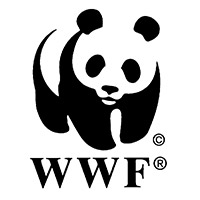
The decision about development plans for the offshore Sakhalin-II drilling platform has been deferred by the Sakhalin Energy consortium, according to the western gray whale expert panel report. The Sakhalin-II drilling platform is located off the coast of Russia. Concerns had been raised over the platform's potential impact on western north Pacific gray whales, of which only an estimated 150 animals remain. WWF and other organizations have campaigned to stop the platform from being built by targeting both the oil company and the banks that are the main investors to the project, and see this as a successful outcome. "Sakhalin Energy has delayed until 2017 its decision about building an additional oil platform, meaning the whales are safe at least until 2020. This gives us more time to convince the company that the project should be stopped for good," said Aleksey Kniznikov, Oil and Gas Programme Coordinator of WWF-Russia. View Ocotber 21, 2013 World Wide Fund for Nature articleView May 17, 2013 The International Union for Conservation of Nature report |
|
 Print version Print version |
Top |
| United Kingdom: Bans All Wild Animals in Circuses Effective 2015 | 1 November 13 |

Leading charities and animal welfare organisations such as The Royal Society for the Prevention of Cruelty to Animal (RSPCA), Born Free Foundation, the British Veterinary Association, and the Captive Animals' Protection Society have campaigned together against wild animals being used in circuses for many years. The RSPCA has been particularly outspoken, warning that wild animals are likely to suffer from being dragged around the country from pillar to post just so audiences can be "entertained". RSPCA senior scientist Dr Ros Clubb said: "It is a great relief that the government has listened to reason and we are back on track to getting a proper ban on the use of all wild animals in circuses". "As the Government has pointed out, there is absolutely no basis for protecting only a select group of wild animals, and no desire to do so from MPs, the public or animal welfare groups. No wild animals belong in a circus". View October 24, 2013 One Green Planet articleView October 23, 2013 Express article View August 9, 2013 Animal Defenders International Worldwide circus bans page View July 9, 2013 BBC News article View Royal Society for the Prevention of Cruelty to Animals campaign page |
|
 Print version Print version |
Top |
| Cold Lake Bitumen Leak Likely Contaminated Groundwater | 25 October 13 |
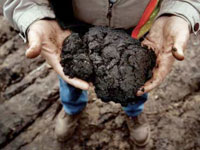
Source: pipe-up.net
Sticky bitumen, which has oozed to the surface for more than six months, "has entered local non-saline groundwater aquifers, likely contaminating the groundwater," says the 15-page enforcement order issued by Alberta Environment October 21st. The enforcement order gives the company permission to drill more wells this winter to test groundwater at the four leak sites and attempt to stop the flow of bitumen moving up through fissures in the rock to the surface. The new order confirms a major problem, groundwater contamination, and should raise a red flag about CNRL's high-pressure steam process known as fracking, for extracting bitumen, New Democrat environment critic Rachel Notley told the Edmonton Journal. "A decade after that process started, Alberta still has no rules on using it — such as how much pressure is safe, and under what geological conditions should it be used," said Notley, adding that the company is still allowed to use high-pressure steam one kilometre from the small lake even when the cause or solution for the leak is unknown. In July, Canadian Natural Resources said a mechanical failure at an old well was behind bitumen seepage at its project on the Cold Lake Air Weapons Range. View October 25, 2013 CBC News articleView October 24, 2013 WC Native News View October 22, 2013 Edmonton Journal article View October 21, 2013 Huffington Post article View September 28, 2013 CBC News article View September 20, 2013 Huffington Post article |
|
 Print version Print version |
Top |
| Grasslands Protection Urgent, CEC Report Launched | 25 October 13 |
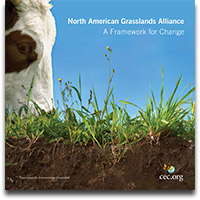
Healthy grasslands support ranching, and provide benefits to wildlife and rural economies. Grasslands are disappearing faster than any other lands. North American Grasslands Alliance: A Framework for Change is the work of over 70 grassland experts from Canada, Mexico and the United States. The document highlights the importance of engaging and working with the stewards of the land—to work together to protect them. The framework provides five key priorities:
View October 23, 2013 Commission for Environmental Cooperation report |
|
 Print version Print version |
Top |
| Russia Drops Piracy Charges Against Greenpeace Activists | 25 October 13 |

Two journalists covering the protest face the same charges. Greenpeace Russia Director Ivan Blokov expressed relief that the piracy charges had been dropped, but maintained all the activists and journalists are innocent. "Of course, our activists are neither pirates nor hooligans," Blokov said. "Hooliganism charges, like piracy charges, can be brought only if there was violence or the threat of violence. It is clear that Greenpeace activists could not use any kind of violence and in the 42 years of the organization's existence, there was not a single case of use of violence. This does not happen and this cannot happen." View October 24, 2013 Global News articleView October 23, 2013 The Guardian article View October 23, 2013 Radio Free Europe/Radio Liberty article View October 23, 2013 BBC News Europe article View October 23, 2013 Hurriyet Daily News article View October 21, 2013 CTV News article |
|
 Print version Print version |
Top |
| Landmark Canadian Hydraulic Fracturing Lawsuit | 25 October 13 |
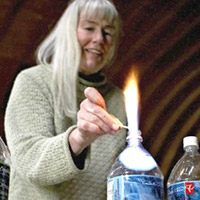
Source: CBC News
Hydraulic fracturing blasts open oil, gas and coal formations with highly pressurized volumes of water, sand and undisclosed chemical fluids or gases. The technology has boosted natural gas reserves but has become the subject of serious government investigations throughout North America due to surface and groundwater contamination. In Report 2011-A Alberta's primary energy regulator, the Energy Resources Conservation Board (ERCB), recently disclosed that the potential for hydraulic fracturing to contaminate useable water aquifers with fracturing fluid chemicals and natural gas is a real public issue, especially in shallow zones. On April 27, 2011, lawyers representing Jessica Ernst, an oil patch consultant with over five decades of experience, released a 73-page statement of claim that alleges that EnCana broke multiple provincial laws and regulations and contaminated a shallow aquifer used by a rural community with natural gas and toxic industry-related chemicals. The claim methodically reports how Alberta's two key groundwater regulators, Alberta Environment and the ERCB, "failed to follow the investigation and enforcement processes that they had established and publicized." "It is worrying that citizens are unable to hold the energy regulator accountable for failing to protect citizens from the harmful impacts of fracking," said Cory Wanless one of the lawyers representing Ernst. View October 9, 2013 CBC News articleView August 21, 2012 Vancouver Island Water Watch Coalition article View April 27, 2012 Global Research article View April 26, 2011 CNW Media Advisory View October 14, 2010 University of Toronto report View Ernst v. EnCana Corporation website |
|
 Print version Print version |
Top |
| World Says No To Fracking | 21 October 13 |

More than 200 actions took place in more than 20 countries spanning six continents, all calling for a ban on fracking. From Australia to India, France to Argentina, South Africa to Canada, and all across the United States, people took action in their communities -- demanding that their elected representatives protect their communities and our planet from fracking and associated activities and work to move towards a clean energy future. The impact of fracking on the environment is substantial. Each well requires up to nine million gallons of water that is combined with chemicals and sand to be pumped into the Earth. This contaminated water can find its way into the water supply or return to the Earth's surface to contaminate the ground. The Global Frackdown anti-fracking demonstrations come on the heels of an anti-fracking protest in New Brunswick turning violent with RCMP using para-military style tactics to arrest protesters. The blockade of a shale gas company's seismic exploration trucks by Mi'kmaq of the Elsipogtog nation and local supporters near Rexton, New Brunswick, started on September 30th and was peaceful until raided in the early morning of October 17th. View Global Frackdown websiteView October 21, 2013 CBC News article View October 20, 2013 RT.com article View October 19, 2013 Common Dreams article View October 2, 2013 Nicholas School of the Environment article View July 28, 2013 Climate Science Watch article |
|
 Print version Print version |
Top |
| Shale Gas Company Loses Bid to Extend Injuction | 21 October 13 |

SWN Resources Canada has been exploring for potential shale gas development sites under a permit issued by the province of New Brunswick. Beginning September 30th, a coalition of Elsipogtog band members and local supporters blockaded the company's seismic exploration trucks in a compound near Rexton, NB. SWN Resources had earlier told a Court of Queen's Bench hearing that the blockade of equipment was costing it $60,000 a day. Last Thursday the protest turned violent when RCMP raided the blockaded, enforcing the original injuction. Grand Chief Derek Nepinak of the Assembly of Manitoba Chiefs (AMC) is in New Brunswick to bring AMC support for the Elsipogtog band. He described the RCMP raid on the protesters last week as the violent use of state power. View October 21, 2013 CBC News articleView October 21, 2013 Global News article, Elsipogtog First Nation criticizes RCMP, promises to keep fighting shale gas View October 21, 2013 Global News article, Community meets in New Brunswick over protest View October 21, 2013 Canada.com article View Ocotber 20, 2013 The Common Sense Canadian article View October 18, 2013 Huffington Post article Watch October 17, 2013 MsNativeWarrior video Elsipogtog Frack Off |
|
 Print version Print version |
Top |
| CETA Would Undermine Environmental Protection | 21 October 13 |

The Agreement would also, for the first time at all levels of Canadian government, open public procurement to European suppliers. This raises very serious concerns about the ability of local governments to foster local sustainable development. The Canada-EU CETA will likely undermine democratic control over public services, provide extensive rights for European corporations and the ability to enforce those rights through unaccountable arbitration, extend patent protections on brand name drugs with an associated sharp rise in drug costs, eliminate buy-local options for municipal governments, and put even more roadblocks in the way of passing effective climate and environmental protection policies. The agreement in principle was signed last week in Europe. It will take until 2015 for CETA to be operational. View Stop CETA Informatio pageView October 21, 2013 WC Native News article View October 18, 2013 Canadian Environmental Law Association article View October 18, 2013 Trade Justice Network article View October 18, 2013 Toronto Star article View February 5, 2013 Canadian Environmental Law Association report View Winter 2011 Columbia Institute report |
|
 Print version Print version |
Top |
| Plummet in Canadian Bee Population Linked to Neonicotinoid Insecticide | 10 October 13 |
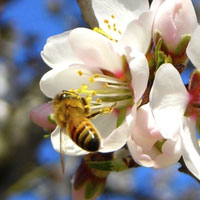
In a recent government test run on 102 dead bees, it was found that 75% of specimens contained high levels of a seed coating insecticide called neonicotinoid. This insecticide, used to cover corn and soy seeds before planting in springtime, has been identified as "highly toxic" to bees, as stated by the American non-profit organization Xerces Society. Neonicotinoids are transmissible to bees through contaminated dust produced by coating and planting processes, and affect the bees' nervous systems in fatal ways. Dan Davidson, of the Ontario Beekeepers Association, states that this is the second consecutive year where mass bee fatalities have occurred. Despite mitigation strategies released last year by the Ontario government, this year is looking to be worse in outcome. Health Canada'a Pest Management Regulatory Agency (PMRA) claimed that the present corn and soy planting practices are "not sustainable" and that "protective measures", such as lubricants to reduce dust and label requirements for neonicotinoid products, must be implemented. Currently, according to the Grain Farmers of Ontario, neonicotinoids are found on nearly all corn kernels planted in the province. Ontario Premier Kathleen Wynne has stated that eduation and awareness of farmers using neonicotinoids is crucial and alternatives to these products must be explored. View October 9, 2013 Ecojustice articleView October 8, 2013 CBC News article View September 29, 2013 Toronto Star article View September 16, 2013 CTV Canada AM article View September 13, 2013 Grainews article View June 25, 2013 West Coast Environmental Law article View The Ontario Beekeepers' Association Change.org page |
|
 Print version Print version |
Top |


 RSS Feeds:
RSS Feeds: